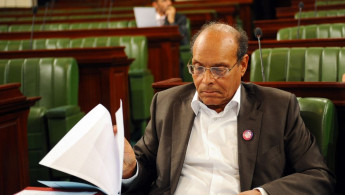Tunisia court sentences ex-president Marzouki to 8 years in absentia
A Tunisian court sentenced former President Moncef Marzouki to eight years in prison in absentia on Friday on charges of assaulting the state security and inciting Tunisians against each other, a judicial official said.
This is the second prison sentence against Marzouki, who resides in Paris, after a judge sentenced him in 2021 to four years in absentia.
Mohamed Zitouna, the spokesperson of the Tunis court, said the verdict was based on statements by Marzouki that included incitement in a speech he gave in Paris, without giving further details.
Marzouki, who was president from 2011 to 2014, is a fierce critic of President Kais Saied.
Saied closed Parliament, sacked the government and began ruling by decree in 2021, a step that Marzouki and main opposition leaders described as a coup.
The Tunisian president, who enshrined his new constitutional powers in a referendum with a low turnout in 2022, has denied his actions were a coup and said they were needed to save Tunisia from years of chaos.
Most opposition chiefs were arrested since last year, including Rached Ghannouchi, the head of the Islamist Ennahda party, and Abir Moussi, the leader of Free Constitutional.
Authorities also detained prominent opposition figures Jawher Ben Mbarek, Khayam Turki, Ghazi Chaouachi, Issam Chabbi, Abdelhamid Jalasi and Ridha Belhaj last year in a crackdown on suspicion of plotting against state security.
The opposition accuses Saied of muzzling the press and imposing authoritarian rule, and says his constitutional changes have pulled apart the democracy built after a 2011 revolution.
Saied rejects those accusations and has called his critics criminals, traitors and terrorists and warned that any judge who freed them would be considered abetting them.
(Reuters)





 Follow the Middle East's top stories in English at The New Arab on Google News
Follow the Middle East's top stories in English at The New Arab on Google News


